- Getting around Lijiang. Dont stay in the Old Towns more than 2 days, there is nothing to do. KRISS Oct 9, 2013 05:46
- 2013 Beijing Temple Fair BENNYLAU Feb 26, 2013 03:29
- Malaysian traveling from KUL - LAX vis Shanghai PVG ZATI_DY Jan 3, 2013 20:15
Pretty in Pink: Reflections on West Lake
- Views: 7205
- |Vote: 2 0
- |Add to Favorites
- |Recommend to Friends
There are times when I must take exception to one of the most oft-repeated cliches in Chinese tourism: 上有天堂,下有苏杭 [shàng yǒu tiāntáng, xià yǒu sū háng]. It’s a beautiful bit of language that suggests that the skies are graced with Heaven, the Earth (or China to be precise) is graced with Suzhou and Hangzhou.
Poetic yes, but accurate? You see the truth is that Hangzhou’s really not so pretty, let alone “paradise on Earth”.
Let’s take public transport as an example. When I’m trying to get from the West Bus Station to the main shopping area by the number 900 bus. I’ve never managed to get a seat on it and more often than not I don’t even manage to get on the bus.
At times like this I wonder if “Hell” is not more appropriate.
I console myself by sinking into a quiet upstairs Starbucks, drinking my first hot chocolate in a year and decide there’s definitely something spiritual about the whole experience.
But then I get to thinking. What if this is all I’ve known of Hangzhou? Haven’t I missed something, haven’t I too easily dismissed as tourist cliche an idea that has maintained power and descended from a distinguished line of contributors?
Hangzhou surely is about far more than its contemporary self. Western-coffee houses and the trappings of the 21st Century aside, I want to discover some of that original spirit that has polished Hangzhou into one of China’s brightest tourist jewels.
And what better time to do it than spring, the time when poets, those most ardent of Hangzhou’s admirers, commemorate the real star in the city’s crown: West Lake. Her spring renown knows no bounds and I hope at this time of year she is in the least danger of disappointing me, and in the greatest likelihood of upholding every glorious claim on her behalf.
The weather is pleasantly mild, there’s that vivacity of newness and growth in the air and at first I’m carried away by the headiness of it all. I write:
“Spring sees the West Lake come out with her finest gown, whose sashaying skirts are the greens of willows decorated with the pink blossoms of plums.
There’s nothing pretentious or modern about her. She won’t change her style to remain in vogue, she’s worn the same colours for over a thousand years. Like all that is natural she is beyond the fickleness of fashion.
For centuries she’s been the pin-up of poets and artists. Chinese emperors and international explorers have been captivated by her, and left their fancy words at her feet. Who am I to do otherwise... “
I stop writing. The romance and legend and history, they’ve almost got me convinced. But then the bubble bursts—
The trouble is that all tributes to Hangzhou are in danger of becoming anachronisms, written about a natural beauty that has been altered significantly by the onslaught of living and modernising.
Modernity in so many cases cares little for the past, particularly in China, and although Hangzhou’s streets are edged with flowers and the pavements are brushed clean by a small army of workers, it’s difficult to imagine this place as Heavenly.
East of the West Lake, the city lives in typical city fashion, with congested multiple-lane roads and an over-worked public transport system operating between a selection of bulk standard office blocks and high-rise apartments.
Thank goodness then that West Lake still occupies her position in the Western reaches of Hangzhou. She’s largely unspoiled even now, but urbanity continues to take its toll.
I see plastic bottles and plastic bags floating in West Lake, a sure sign that the millions of tourists she receives every year are not doing her any favours. The city itself contributes no less, with its increasing vehicle exhaust and factory fumes that assure murky-grey skies are more often seen overhead than blue ones.
That Hangzhou still manages to raise itself head and shoulders above other Chinese cities is by the good luck that the blessing of West Lake’s former glory continues to resonate. There’s much face to be lost if Hangzhou’s star attraction tumbles.
It’s no coincidence therefore that West Lake’s pleasure boats all run on electricity now, or by that old-fashioned notion of human power: oars! A testament to the city’s desire to try and keep West Lake’s waters clean, and a testament to hope.
In order to try and explore West Lake in as “green” a way as possible, I’m resorting to my feet, or that two-wheeled “green machine”: the bicycle.
One of the joys of China is that bicycles are nearly always to be found for hire. West Lake is criss-crossed by cycle lanes and most areas are accessible by bike. Cycling is also great because you can stop whenever you want to take photographs, it’s cheap and it keeps you fit. I love bicycles!
You can hire bicycles by the hour. The vendor will note the time that you left and then you are at liberty to explore, returning to the vendor before the end of the day (usually daylight hours which stretch into the evening during the summers) and paying for the number of hours you are out. Alternatively, if you want to hire a bike for the whole day, try negotiating a fixed price with the vendor, depending upon how much you are willing to pay!
Once I’ve got my wheels and my lock, West Lake is at my disposal, to explore, admire and photograph, in my own time, at my own pace.
Sometimes it’s best not to have a plan, and I just decide to follow the cycle lanes around the lake, stopping off at any gardens or areas that look particularly interesting. I discover what is to become one of my favourite spots, in a quiet and secluded area of gardens located at the Southern tip of West Lake.
An inner Peony Garden is a delight of traditional Chinese garden design, with a predominance of rock and gravel interspaced with carefully positioned shrubs and flowers. An octagonal pavilion stands at the “top” of the garden from where I can admire the fragrance and colour of the Peony blooms.
Getting to the garden requires a journey through groves of Plum trees set out across grassy lawns and in Spring the effect is spectacular, rather like a blanket of pale pink snow settled mid-air, each tiny flower a cup of snowflakes.
The poets and painters must surely have sat at places such as this to compose, and I see nothing here (except the odd signage in English) to remind me that I’m in any Hangzhou other than that fabled paradise of old. As if to add veracity to my claims, I see a fairy here, tall and elegant and pure white with a tiny crown of feathers, hiding in a tree: a peacock.
The West Lake is famous for its Spring blossoms and to see blossom trees in their glory, one of the best places to head for is Solitary Hill. Located along the Northern bank of the West Lake it is an island linked to the mainland by two causeways and is accessible by foot.
Solitary Hill has many imperial connections, having provided the temporary quarters for emperors from the Southern Song and Qing Dynasties. Although I find it more compelling that Lin Hejin, a poet from the Northern Song Dynasty, spent a time living here in seclusion.
For over a thousand years, travellers, poets, emperors and officials have made their way to Solitary Hill to enjoy the Spring show of blossoms from Prunus mume trees planted all around the hill.
It’s a place indelibly linked with all the romance of the past, and though seclusion is rare, it’s still one of the few places you can sit against ivy-infested walls and imagine yourself centuries before.
The Crane Pavilion that now stands on the site of the former residence of Lin Hejin is beautifully situated to view a collection of 400 of the Prunus mume. It also contains the largest stele at West Lake that is carved with a 100-word prose poem titled “The Dancing Crane”. Below the pavilion is a small pond with a sculpture of 2 cranes with their necks intertwined.
The island also contains many outdoor sculptures situated in lawns and woodlands strewn with seed-eating squirrels, Japanese maples, dwarf pines, exotic palms (Trachycarpus), bamboos and of course, the slender skirts of weeping willows. There are towers, tiny temples and stone statues of poets and statesmen and at the top of the hill you can look out over West Lake.
Zhejiang’s Provincial Museum, housed on the island is also worth visiting.
Most traditionally of all, enjoy, with many other Chinese, a cup of tea at one of the outdoor teahouses where the blossom trees above, caught in the breeze, drop petals of silent snow.
Leifeng Tower, restored within the last ten years, is an unmissable marker on the Southern shores of West Lake, standing many storeys high, and impressively lit once night falls. The tower adds a distinct Chinese flavour to West Lake’s skyline, a distinct air of the past and is steeped in one of West Lake’s most famous legends, that of the white snake.
Part of Hangzhou’s ancient charms are the stories and legends associated with it. Story has it the female snake fell in love with a man and changed herself into human form, only to be thwarted in love and to die broken hearted. It’s said her bones lie buried at the foot of the tower.
It’s possible to climb the tower and view West Lake from its “heavenly” heights in the sky. The tower also makes a picturesque impression, framed by the snappy brightness of the newly-leafed willows and the strong pinks of Cherry blossoms, whilst beneath it the circular life-buoys of pleasure boats bob in regimental lines.
In visiting and writing about West Lake, I can’t but help be influenced by the accolades of history that already adorn her. Painters have captured her most glorious moments, from every season under sun and moon. Poets have locked themselves up in her, writing her spirit and charms into a thousand verses. I also can’t help but be influenced by this 21st Century version of the city, which in many ways seems at odds with the lingering aura of a bygone appeal.
In so many ways it seems that this little piece of Heaven on Earth can’t possibly survive, and in the city itself I believe it hasn’t.
Yet, there’s an unmistakable magic that persists here, if you look closely enough. It’s in the smallnesses, in the colours and textures of West Lake’s landscapes. It’s in the same places, I’m sure, as it has always been, and they’re still here:
The old man taking his gondola home at the close of day; the slap of wave against the grubby wooden hull; the intermittent electric pinks of a cherry blossom; the sunny brightness of dandelions; the opening of buds on the weeping willows like a million green beetles, wings aloft, ready to fly over the smiling curves of bridges and their reflections.
Heavenly indeed.
I hope others who read this will think about their impact on West Lake and watch over her fragile beauty. Help to keep her as she still is, as she has been for so many springs before, this pretty in pink.



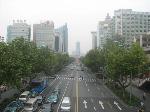
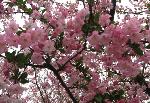
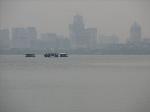

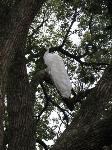
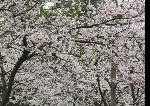
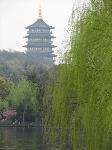
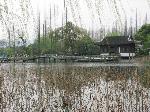
 Copyright © 1998-2026 All rights reserved.
Copyright © 1998-2026 All rights reserved.
1.
Jul 27, 2011 21:07 Reply
ROCKY_2010 said:
i love there and this is the reason that i want to live there. now i married a local lady there and have a family. i always take my kids there with my wife, it is quite nice. I will not say it is like a Paradise, but actually, the best place i have ever known.
2.
Apr 23, 2008 23:57 Reply
XIEJIANFA said:
I still believe that Hangzhou is my paradise.I love the weather, the nature, the people and the food. I felt that I have finally came home. Maybe, I have lived here in my previous life. Heh heh.... I am from Malaysia. When I came to this place in June 2006, I have made it a point to live the rest of my remaining days here when i retire in 10 years time. "To wait for an immortal beauty is not long and it is the longing that is truly worthy" Then i visited this place again in December 2007. It is like secretly visiting a lover. Ha ha. The former visit, I came with my wife and the latter, my teenage son." Above is heaven, below is Suzhou and Hangzhou" This will remain till eternity.
3.
Feb 26, 2008 02:08 Reply
FAERIEQUEENE said:
Sweet disillusionments... of the "heaven on earth", only recollected by the aesthetic mind's eyes...., and the meaningful past and stories of a place, especially true in china, that one might see or miss in sightseeing a landscape !